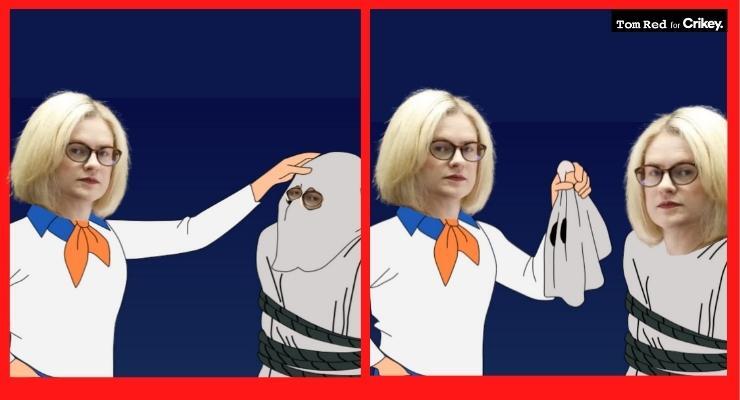
The federal government is pushing ahead with its plan to force social media companies to hand over contact details of abusive users once defamation cases are launched.
It’s a contentious idea — and one that seems strange for a government whose members have been accused of trolling and online abuse from fake accounts. Here are the anonymous accounts we know about.
Liberal MP Amanda Stoker
The assistant federal attorney-general admitted in question time yesterday she operated a Facebook account under a different name, using her nickname and middle name “Mandy Jane”. She said it was to protect her children’s privacy, and that the anonymous account was a “technical snafu” — arguing she was a “boomer” when it comes to technology, despite being a millennial. She used the account to hype up posts on her public political account.
Secret Wikipedia editors
Thousands of Wikipedia entries have been edited by anonymous government officials and political staffers. In 2016, the heads of Defence, Foreign Affairs and Trade, Health, Agriculture and Parliamentary Services departments were ordered to investigate possible breaches of government IT policy after offensive edits were made from government IP addresses.
One of the most concerning changes appears to have been made by someone on Defence network in May — the Schutzstaffel (Nazi SS) Wikipedia page was edited to state it was “justified” in killing Jews. The edit removed the word “genocide” and also reduced the number of Jews killed from 6 million to as few as 30. Another change stated the Iranian President had a flatulence disorder, causing them to “constantly expel gasses”.
Former Liberal MP and those involved in WeChat anti-Labor posts
An investigation in 2019 by The Sydney Morning Herald found that during the federal election, posts spreading misinformation about Labor’s policies could be traced back to Liberal Party members, including former MP Michael Gidley and Gladys Lui. Gidley said he stopped using the account before the posts were made but didn’t say whether the Liberal Party ran it.
Fake posts that popped up stated former Labor leader Bill Shorten would introduce school programs teaching students how to have gay sex, allow refugees to bring six family members with them to Australia, and a doctored tweet of Shorten’s saying he thought immigration from the Middle East was key to Australia’s future.
Industry Minister Angus Taylor
In 2019, Taylor commented on his own Facebook post, writing: “Fantastic. Great move. Well done Angus.” It probably wasn’t a show of self-love, rather Taylor or a staffer forgetting to switch accounts to a fake one to shower the minister in praise. The post was on an announcement for an extra 1000 car spots at Campbelltown station in NSW — part of the car park rorts scandal, where the Commonwealth picked the projects based on no guidelines, criteria or evaluation process.
He later deleted the comment, but the thread was littered with similar comments of single-word praises.
Former Labor leader Mark Latham
Latham was caught trolling and abusing people — including Australian of the Year and domestic violence campaigner Rosie Batty, transgender officer Catherine McGregor, and female journalists — through the Twitter account @RealMarkLatham. He later resigned once the abuse was publicised.
Liberal MP Andrew Laming
Laming came under fire this year for harassing and bullying women via social media — for which he had to undergo a pithy online empathy training course by an unnamed provider and got to keep his job. An investigation found he had more than 30 Facebook pages and profiles, disguising himself as a community group, news pages, and an educational institute.
Independent MP Craig Kelly’s staff
The former Coalition MP’s staffer Frank Zumbo, who has been accused of inappropriate behaviour and sexual harassment, set up more than 30 community group pages in Kelly’s electorate. Although the pages weren’t run by an anonymous account, Zumbo didn’t disclose he worked for Kelly (though didn’t seem to post anything political).
Liberal premier’s staffer
Former Liberal Tasmanian premier Will Hodgman had a principal adviser called Martine Haley who used the alias “Alice Wood-Jones” online to send photos of a woman’s comments about abortion on Twitter to her employer.
Haley had also been using the account to push party propaganda and attack other political parties for months. She later resigned.








Crikey is committed to hosting lively discussions. Help us keep the conversation useful, interesting and welcoming. We aim to publish comments quickly in the interest of promoting robust conversation, but we’re a small team and we deploy filters to protect against legal risk. Occasionally your comment may be held up while we review, but we’re working as fast as we can to keep the conversation rolling.
The Crikey comment section is members-only content. Please subscribe to leave a comment.
The Crikey comment section is members-only content. Please login to leave a comment.